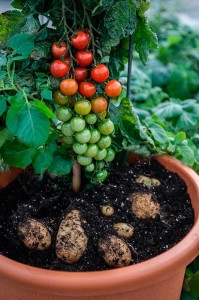Love growing potatoes and tomatoes? This spring, gardeners in the U.S. (and Europe) will be able to get both tuber and fruit from a single grafted plant.
It even has a catchy name: Ketchup ‘n’ Fries.
“It’s like a science project,” says Alice Doyle of SuperNaturals Grafted Vegetables, the company that’s licensing the variety for U.S. markets from the U.K. company that developed it. “It’s something that is really bizarre, but it’s going to be fun [for gardeners] to measure and see how it grows.”
This isn’t a genetically modified organism but a plant of two different nightshades: the top of a cherry tomato grafted onto a white potato.
“Tomatoes and potatoes are in the same family, and that makes it feasible,” says John Bagnasco, also of SuperNaturals.
Archive for the Clippings department
Genetically modified apple variety doesn’t brown, awaits USDA approval
NPR:
If you (or your children) turn up your nose at brown apple slices, would you prefer fresh-looking genetically modified apples?
Neal Carter, president of Okanagan Specialty Fruits, in British Columbia, Canada, certainly hopes so. His company has created the new, non-browning, “Arctic” genetically modified apple variety, and he’s hoping for big orders from despairing parents and food service companies alike. Food service companies, he says, would no longer have to treat their sliced apples with antioxidant chemicals like calcium ascorbate to keep them looking fresh.
The cost savings “can be huge,” he says. “Right now, to make fresh-cut apple slices and put them in the bag, 35 or 40 percent of the cost is the antioxident treatment. So you could make a fresh-cut apple slice 30 percent cheaper.”
Gardening seminar coming to Shelby Township
The Outdoor Living Extravaganza, presented by Proven Winners, is coming to Cherry Creek Golf Club in Shelby Township on Saturday, March 21, 8:30am – 4pm.
This educational gardening seminar will inspire you with new plants, design ideas and more along with an opportunity to purchase plants and other gardening goods. All participants will receive a complimentary gift bag and plant along with a host of ideas to put to use right away in your garden.
Speakers will include P. Allen Smith, Award Winning Garden Designer, Author and TV Host; Kerry Mendez, Garden Expert and Author; and John Gaydos, Director of Product Development and Promotion for Proven Winners.
For more information and to purchase tickets, click here.
State house considers right to farm bill
MI Food News:
Representative Tim Kelly (R-Saginaw Twp) has introduced House Bill 4012 to allow people who live in residential neighborhoods in Michigan cities the right to have a backyard farm from which they could sell farm products.
Amending the “Michigan zoning enabling act” would restore the right that many urban folks thought they enjoyed under Michigan’s Right to Farm Act. Recent regulatory changes have removed the legal protection for people who thought they had an inherent right to raise food for themselves and their families and sell any excess for extra money.
Ann Arbor to host National Rock Garden Meeting in May
 The Great Lakes Chapter of the North American Rock Garden Society is excited to host the group’s 2015 Annual Meeting in Ann Arbor, from May 7-10, 2015.
The Great Lakes Chapter of the North American Rock Garden Society is excited to host the group’s 2015 Annual Meeting in Ann Arbor, from May 7-10, 2015.
This is a superb opportunity to see and hear great speakers, and see great gardens. There will also be choice plants, tufa, troughs, and books available to purchase. It is a rare chance to meet and talk with seasoned rock gardeners from all over the U.S. and Canada—without flying to a distant city.
Plus, there is a post-conference tour from May 10-12. This field trip is to the “Straits Region” of Michigan with stops on the way there and back. The focus will be on natural rock gardens and rock garden plants in the wild. This includes shaded and sunny rock outcrops, rocky, gravely, and sandy beaches, plus a stop to see large stands of trilliums.
For more information, click here.
Young generation finds future in agriculture
NPR:
America’s heartland is graying. The average age of a farmer in the U.S. is 58.3 — and that number has been steadily ticking upward for more than 30 years.
Overall, fewer young people are choosing a life on the land. But in some places around the country, like Maine, that trend is reversing. Small agriculture may be getting big again — and there’s new crop of farmers to thank for it.
On a windy hillside just a few miles from Maine’s rocky mid-coast, it’s 10 degrees; snow is crunching underfoot. Hairy highland cattle munch on flakes of hay and native Katahdin sheep are mustered in a white pool just outside the fence. Not far away, heritage chickens scuttle about a mobile poultry house that looks a bit like a Conestoga wagon.
Marya Gelvosa, majored in English literature and has never lived out in the country before. “Just a few years ago, if you’d told me that I was going to be a farmer, I would have probably laughed at you,” she says.
Monarch butterflies continue their decline
The Detroit News:
Brenda Dziedzic caught the bug, or butterfly, early on.
She has fond memories of the fields near where she grew up in Waterford Township teeming with butterflies at a time in her life when she didn’t know a black swallowtail from a pearl crescent.
“They always just seemed so beautiful and peaceful,” said Dziedzic, 62, who now operates a butterfly habitat in Westland. “When you see them, it just brings a smile to your face.”
Smiles have been in shorter supply recently as the population of monarch butterflies, one of the most popular species in the United States, has been in a steep decline in Michigan and across the country. It’s a pattern experts believe was caused by a combination of factors and put the future of Danaus plexippus in question.
New DTE Energy tree trimming program faces homeowner backlash
If you have trees on your property that grow near power lines, pay close attention to this developing story…
Hometown Life:
Faced with the threat of an emergency injunction, DTE Energy has agreed to temporarily stop an aggressive tree-trimming program in the Bloomfield area.
“We voluntarily agreed to put the work on hold,” DTE spokesman Scott Simons said Wednesday. “We will be meeting Friday with Bloomfield Hills City Manager Jay Cravens and Bloomfield Township Supervisor Leo Savoie to continue building on a series of meeting we’ve had with both communities.”
Following a directive from the Michigan Public Service Commission, DTE Energy and Consumers Energy are implementing an aggressive tree trimming program to help alleviate future power outages.
Additional Information:
The Michigan Gardener bookstore is OPEN for business
 Our bookstore is now open. You can now browse all the titles we feature in the “Books for the Michigan Gardener” feature. Best of all, the bookstore is powered by Amazon so there is no need to setup any new accounts or input payment information. There is no better time than now to purchase some reading or reference material for the gardener on your gift list. Happy shopping!
Our bookstore is now open. You can now browse all the titles we feature in the “Books for the Michigan Gardener” feature. Best of all, the bookstore is powered by Amazon so there is no need to setup any new accounts or input payment information. There is no better time than now to purchase some reading or reference material for the gardener on your gift list. Happy shopping!
Cherry trees planted on Belle Isle, marking first phase of replanting project
Volunteers helped replant 120 flowering cherry trees around Belle Isle’s Scott Memorial Fountain in mid-November. Overseen by the Department of Natural Resources, the project was organized by The Greening of Detroit, a nonprofit organization established to guide and inspire the reforestation of the city.
“We are very excited to contribute to the ongoing beautification of Belle Isle park with the cherry tree planting,” said Rebecca Salminen Witt, president of The Greening of Detroit. “We have planted hundreds of trees there in recognition of the important role it plays in enhancing the quality of life in our city.”
In 1994, Toyota (Detroit’s sister city from Japan) donated flowering cherry trees to the city. Many were planted on Belle Isle near Sunset Point and around the Scott Memorial Fountain. Due to disease and damage from insects, many of these trees have since died or had to be removed because of poor condition. “The tree replantings of a disease-resistant species will serve to further beautify Belle Isle by filling these gaps,” said Kevin Sayers, coordinator of the DNR’s Urban Forestry program.
“This planting was the first phase in a multiphase project to replant trees in maintained (and other high-use) areas of the park.” Sayers also noted that the multiphase plan may be implemented over several years, with the next phase starting next spring. The cherry tree replanting project was funded as part of a $150,000 U.S. Forest Service grant. This grant is also funding hazard-tree removal and creation of a tree inventory and management plan for Belle Isle.
Since December 2013, the DNR has worked to rid the island of hazard trees in heavily used areas that posed a risk to public safety. DNR staff first inspected the trees. The majority of trees marked and felled showed obvious signs of hazard conditions. More than 200 hazard trees were felled, with additional trees lost during summer and early fall storms.
“(This cherry tree project) was a great start to replanting some of the trees lost on the island to storms, disease and human activity, and those just coming to the end of their natural life cycle,” Sayers said. “We had a successful volunteer turnout and fantastic cooperation between multiple agencies, and I look forward to continuing this momentum into the spring.”
- « Previous Page
- 1
- …
- 8
- 9
- 10
- 11
- 12
- …
- 26
- Next Page »

